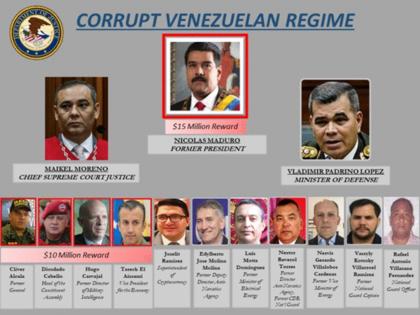Colombian convicted in US claims Venezuelan generals helped run drug empire
Published in News & Features
Alvaro Fredy Córdoba Ruiz, the brother of the late Colombian politician Piedad Córdoba who is currently serving a 14-year sentence in the U.S. for drug trafficking, has offered a startling account of a continent-spanning cocaine operation allegedly run by senior Venezuelan military officials.
In a letter filed on May 2025 with the U.S. District Court in Manhattan, Córdoba asked a federal judge to reduce his sentence to five years, citing what he describes as a minor role in a far-reaching narcotics scheme. His request, however, does more than seek leniency—it alleges the involvement of high-ranking Venezuelan officials in what U.S. prosecutors have long called the “Cartel of the Suns,” a term referring to the gold insignia worn by Venezuelan generals.
“For several decades, the defunct president of the South American country, Hugo Rafael Chávez Frías, grouped into an organization that exports illicit drugs high-ranking generals of the Venezuelan military,” Córdoba wrote in the letter to District Judge Lewis J. Liman.
According to Córdoba, the network — allegedly put together under Chávez’s leadership — connected top military officials with Colombia’s now-demobilized FARC rebels, including former commander Rodrigo Londoño Echeverri. In a striking admission, Córdoba also claimed the operation “involved my beloved, departed sister Piedad Córdoba Ruiz,” a former Colombian senator long accused by authorities of ties to armed groups, though never convicted.
Córdoba portrays himself as a peripheral figure ensnared by association. “I am nothing more than a minor, defenseless and harmless actor in this complex criminal network,” he wrote, describing his role as little more than a “secretary, messenger, and clerk” to his sister.
The “Cartel of the Suns” has been at the center of U.S. anti-narcotics investigations for over a decade. American prosecutors and intelligence assessments describe it not as a traditional cartel but as an informal alliance of Venezuelan military officials and politicians using state resources—airfields, diplomatic channels and naval facilities—to facilitate large-scale cocaine trafficking. Much of the cocaine is sourced from Colombia and shipped through Venezuela toward the Caribbean, Central America and Europe.
In 2020, the U.S. Justice Department indicted President Nicolás Maduro — Chávez’s successor —and more than a dozen other Venezuelan officials, calling the country’s leadership a “narco-terrorist enterprise.” The indictment alleged that Chávez created the cartel to “flood the United States with cocaine,” generating billions in illicit profits.
Last year, the U.S. government increased the rewards for the capture of the Venezuelan strongman and his number two, Diosdado Cabello, to $25 million each. Both are believed to be the current leaders of the cartel.
The U.S. government also issued a $15 million reward for the capture of Defense Minister Vladimir Padrino Lopez. All three regime officials face drug-trafficking charges in U.S. courts; the rewards on Maduro and Cabello are the maximum authorized in the United States for crimes linked to drug trafficking.
Córdoba’s case is linked to a failed cocaine deal involving alleged operatives from a Colombian-Venezuelan trafficking cell. According to prosecutors, the 2022 meeting that led to his arrest included individuals identified as “Comandante Martín,” “Héctor,” and Libia Amanda Palacio Mejía—whom Córdoba claims were the operation’s actual organizers. He was extradited later that year and sentenced in 2024.
Córdoba contends that his lengthy sentence reflects the political weight of his family name, rather than the scope of his actions. His sister, Piedad, who died suddenly in January 2024, was a prominent figure in Colombian politics and a polarizing intermediary in negotiations with the FARC. Though never formally charged with criminal activity, she was scrutinized by U.S. and Colombian authorities for her alleged links to insurgent groups and leftist governments across the region.
While Chávez consistently denied involvement in drug trafficking, his administration fostered ties with guerrilla organizations and was accused of shielding FARC leaders and cocaine shipments. One of the most prominent figures implicated in U.S. investigations, former Venezuelan Gen. Clíver Alcalá Cordones, surrendered to U.S. authorities in 2020 and reportedly became a cooperating witness.
Córdoba’s letter concludes with a plea to return to Colombia, where he says he hopes to care for his ailing partner and begin again.
“I have already served three years,” he wrote. “It would be fair, adequate and appropriate to return to my country, return to my home and support my family.”
©2025 Miami Herald. Visit at miamiherald.com. Distributed by Tribune Content Agency, LLC.







Comments